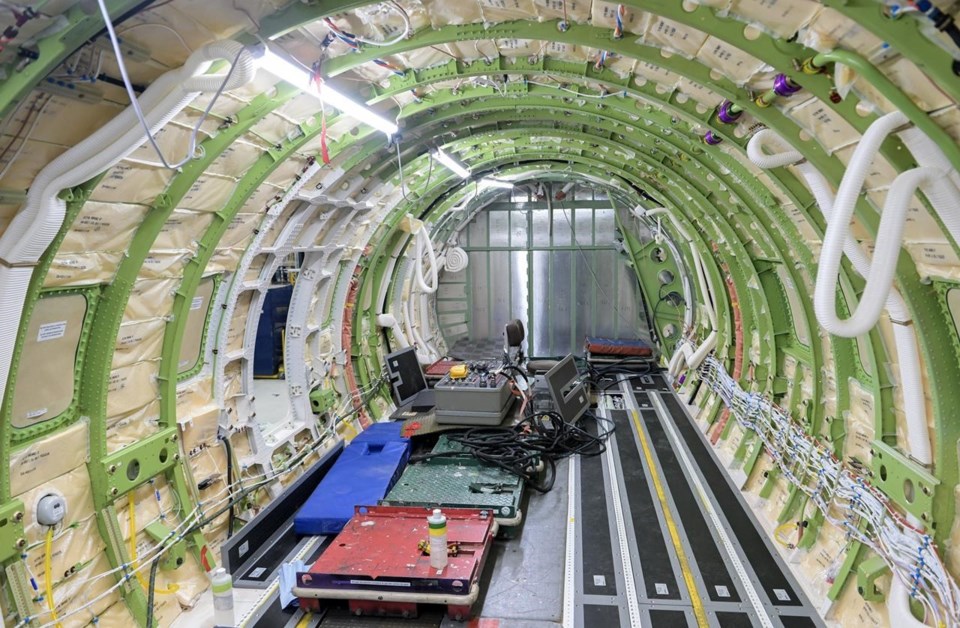MONTREAL — Demand for private planes remains hot even as the economy cools, according to Bombardier Inc. executives.
CEO Éric Martel said Thursday that business jets are not among the sluggish markets threatening to drag down Canada's economic output this year.
"We still have about the same proportion of high-net-worth individuals," he told analysts on a conference call, adding that despite the economic environment, people still need to move around.
"We did a lot of work by Microsoft Teams or Zoom in the last couple of years, but still going and visiting a factory and really assessing what's going on and talking to customers remain very important," he said, noting that interest is "really picking up" in Asia.
Charter services are becoming increasingly popular, even if ownership by businesses and the ultra-wealthy may be slowing, Martel said.
"Some corporations make the choice to say, 'I don't have my own fleet anymore.' And we see that demand going to fleet operators, which is actually a pretty good thing for us," he said, though he noted that Bombardier is not immune to broader market forces.
"If the economy really deteriorates, is there going to be a slowdown on corporate? Probably."
But Martel believes the unchanged $14.8-billion backlog of plane orders now presents a lower risk of order cancellations. "We had speculators. Today we don't have that; they're real individuals or corporations who want to have their airplane."
For now, the main challenge has been keeping up with demand amid the sector's ongoing supply chain bottlenecks, he said.
Bombardier notched slightly more deliveries last quarter than a year earlier, turning a US$302-million profit and boosting revenue by 17 per cent — due in part to higher prices, the company said.
One analyst on the call noted the problems confronting rival Gulfstream Aerospace, which reported lower than expected earnings last year and weaker forecasts for 2023.
"We're probably facing the same types of challenges that they do face. We saw them coming earlier — we saw them and we did mitigate those risks," Martel said.
"We feel pretty good about the outlook we provided for the year."
Last month, Bombardier increased its financial targets for 2025, aiming for more than US$9 billion in revenue for 2025, up from about US$7.5 billion.
The aircraft maker is looking to boost production of private jets to 138 this year from 121 in 2022, with the assembly process on track, executives said Thursday. Bombardier rolled out 22 Challenger and Global jets in its first quarter, versus a consensus expectation of 24 and compared with 21 planes a year earlier when it still also made the historic Learjet, which is no longer in production.
The banking crisis that rattled markets prompted a pause in new bookings earlier this year, but only for a few weeks, Martel said.
Meanwhile, roughly five per cent of all used business jets worldwide are currently for sale. That marks an increase from 3.1 per cent as of February 2022 — the lowest level in more than 25 years, according to market data firm Jetnet IQ — but still means new products offer a likelier option for buyers, which bodes well for Bombardier.
Martel called the percentage of pre-owned inventory on the market "extraordinarily low" versus a more typical range of between 10 and 14 per cent.
Business at Bombardier's service centres across six continents also ramped up, jumping 15 per cent year over year to US$433 million and comprising 30 per cent of its US$1.45-billion revenue.
The global business jet market is expected to grow to US$23.7 billion by 2028 from US$18.4 billion last year, according to a March report from market research firm IMARC Group. That's despite a roughly four per cent year-over-year dip in the use of business jets in the U.S. and slight drops in Europe last quarter, according to the Federal Aviation Administration and Eurocontrol. Both 2021 and 2022 saw large leaps in private plane use.
Since selling off its remaining stake in the Airbus A220 jetliner program in 2020, Bombardier has focused exclusively on the burgeoning business jet market while continuing to chip away at its debt load.
The 81-year-old company paid another US$400 million in debt in the first quarter, reducing its ratio of net debt to adjusted earnings to 4.9 times, down from 8.2 times a year ago. By the end of 2025, it expects to hit a ratio of 2.5 times.
On Thursday, Bombardier reported US$302 million in net income for the quarter ended March 31 after a US$287 million loss in the same period a year earlier. Revenue rose to US$1.45 billion from US$1.25 billion.
The Montreal-based company, which keeps its books in U.S. dollars, said profit amounted to US$2.98 per diluted share in its first quarter compared with a loss of US$3.09 per diluted share a year ago.
On an adjusted basis, the aircraft maker earned US$1.06 per diluted share in its latest quarter compared with a loss of 80 cents per share in the same quarter last year. The figure is 839 per cent higher than analyst expectations of a per-share loss of 14 cents, according to financial markets firm Refinitiv.
This report by The Canadian Press was first published April 27, 2023.
Companies in this story: (TSX:BBD.B)
Christopher Reynolds, The Canadian Press



